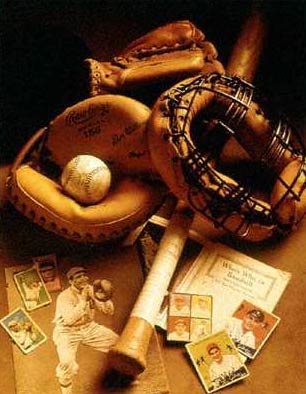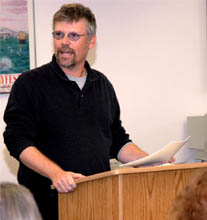|

Alan Berecka
Reconciliation
Any true act of forgiveness participates in the sacrament of Reconciliation.
--Fr. Efren Nano
As a child I spent my days playing
self-invented games with baseball cards.
I transformed my mother’s well-kept den
into a not-to-scale replica of Yankee Stadium.
The house that Berecka built consisted
of reassigned furniture. The afghan
covered sleeper couch became the bleachers
in deep center. The footrest of my dad’s recliner
became the screen behind home plate,
the assorted cigar and shoe boxes
that housed my collection were arranged
in a semi-circle and became the outfield wall.
Four Nestea baseball coins—three of plastic
for the bags and one of tin for the dish—
were laid out three feet apart on the green
shag carpet. A brown ceramic ashtray
turned upside-down became the mound.
I rolled empty Hershey Kiss wrappers
into game balls. After nine cards
took the field, I hummed the anthem.
Play ball. I knelt beside the plate,
a hitter gripped in my right hand.
I flicked a pitch with my left thumb.
The batter swung. Some men dribbled
slow rollers that died in the high infield grass,
others ripped frozen ropes into the gaps.
Still others, like Mickey Mantle, possessed
the great power to lift the ball deep, pulling
Ballantine Blasts beyond the Thom McAn box
that stood down the line in shallow right.
As I dragged the Mick around the bases,
he fell into his home run trot. As he rounded
third, he tipped his helmet to me. After crossing
the plate, he shook hands with his teammates,
who lined up to welcome him back to their dugout
that sat below the bottom shelf of our coffee table.
My mom never saw the stadium,
its invisible white facade, never thought
our television resembled the monuments
in deep center. She only saw the mess and tired
of working on the grounds crew, straightening
the chewed up field yet again. Like an ump
staring down an irate Ralph Houk, she warned me,
Clean up this junk, or it will all get heaved out.
And most of it did get tossed that day
my best sluggers decided to relax
out on the field between the games
of a regularly scheduled twin bill.
At first, my grief paled and confused her,
but she regrouped to say, Some lessons
are harder than others. Besides, son,
you were warned, and what’s done is done.
Still, I managed to keep a silent hope
that those cards had not been banned
but only suspended by a commissioner
whose punishments were known to be just.
Surely, she had thought this case through.
Once my lesson had been well learned, the Mick
and the others would return from a secret place
to resume their careers. But as each birthday,
Christmas and Easter passed, I realized my cards,
like Gehrig and Ruth after their numbers
had been retired, were gone for good,
but not forgotten. When we were teens, my sister
bought me the I’d be rich, but my mother threw out
my baseball cards T-shirt that I wore everywhere.
One semester while in graduate school, I sold
my Roses and Carews to pay for books.
I couldn’t resist reporting back that my Mantles
could have covered my tuition and fees as well.
By the time my son was playing Pokemon
games with cards that I failed to understand,
the baseball card market had crashed,
and I realized that belting tin foil balls
for home runs with my cardboard heroes
had done little to preserve their value.
They were worth even less that night as I sat
my watch next to her bed at the cancer hospice.
Sedated she mostly slept, so the sudden sound
of her voice shook me, but not nearly as much
as her words which offered the grace to absolve us
both. Son, I’m sorry...those damned baseball cards.
How Money Changed the Game
Gladly the nickel was spent
for five fact-backed images
of Topps' modern heroes.
As I peered down at the unopened
pack, my heart raced like a runner
on a squeeze play. Oh, please God,
don't let there be any doubles,
or, if you could, oh, gosh God,
if You could swing it, maybe
even a Mantle or a Mays.
The opening game jitters
were felt on the feel of small
grubby fingers which found
the gap, split the seam and uncovered
the bubble gum scented dreams
that lay stacked in a bat-calloused
grip. Then, inventory taken, the new
roster set, the gum, stale as always,
broke in half and was wadded and chawed
while I walked home. I managed a smile
for new names acquired, new deals
to be dealt, and my next nickel spent.
Today, the survivors of my Mother's
cleaning frenzies and those spared
from my bicycle's spokes, rest entombed
in plastic with my latest investments.
©2005 by Alan Berecka
 Alan Berecka resides in Sinton, Texas, with his wife and two children. His poetry has appeared in American Literary Review, Red River Review, Windhover, and New Texas. The Trilobite Press published his chapbook Each Man Has One Life. He earns his keeps as an academic reference librarian
Alan Berecka resides in Sinton, Texas, with his wife and two children. His poetry has appeared in American Literary Review, Red River Review, Windhover, and New Texas. The Trilobite Press published his chapbook Each Man Has One Life. He earns his keeps as an academic reference librarian
|



